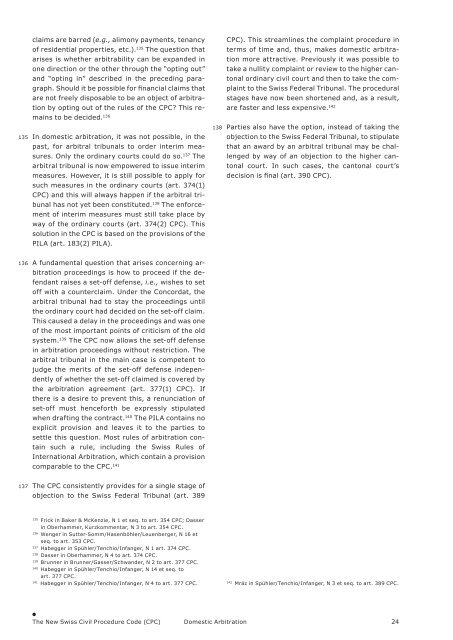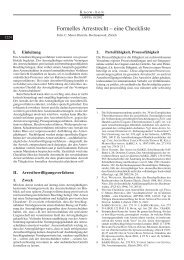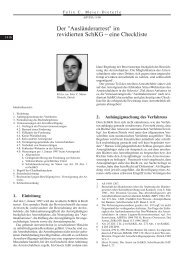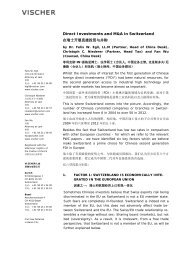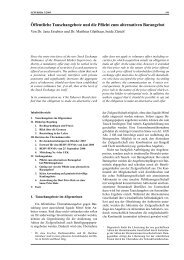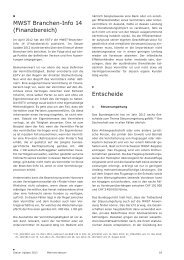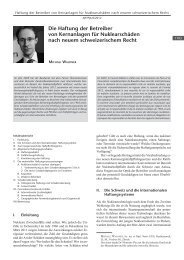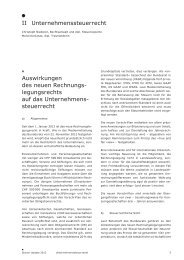The New Swiss Civil Procedure Code (CPC) - Vischer
The New Swiss Civil Procedure Code (CPC) - Vischer
The New Swiss Civil Procedure Code (CPC) - Vischer
You also want an ePaper? Increase the reach of your titles
YUMPU automatically turns print PDFs into web optimized ePapers that Google loves.
claims are barred (e.g., alimony payments, tenancy<br />
of residential properties, etc.). 135 <strong>The</strong> question that<br />
arises is whether arbitrability can be expanded in<br />
one direction or the other through the “opting out”<br />
and “opting in” described in the preceding para-<br />
graph. Should it be possible for financial claims that<br />
are not freely disposable to be an object of arbitra-<br />
tion by opting out of the rules of the <strong>CPC</strong>? This re-<br />
mains to be decided. 136<br />
135 In domestic arbitration, it was not possible, in the<br />
past, for arbitral tribunals to order interim mea-<br />
sures. Only the ordinary courts could do so. 137 <strong>The</strong><br />
arbitral tribunal is now empowered to issue interim<br />
measures. However, it is still possible to apply for<br />
such measures in the ordinary courts (art. 374(1)<br />
<strong>CPC</strong>) and this will always happen if the arbitral tri-<br />
bunal has not yet been constituted. 138 <strong>The</strong> enforce-<br />
ment of interim measures must still take place by<br />
way of the ordinary courts (art. 374(2) <strong>CPC</strong>). This<br />
solution in the <strong>CPC</strong> is based on the provisions of the<br />
PILA (art. 183(2) PILA).<br />
136 A fundamental question that arises concerning ar-<br />
bitration proceedings is how to pro ceed if the de-<br />
fendant raises a set-off defense, i.e., wishes to set<br />
off with a counter claim. Under the Concordat, the<br />
arbitral tribunal had to stay the proceedings until<br />
the ordinary court had decided on the set-off claim.<br />
This caused a delay in the pro ceedings and was one<br />
of the most important points of criticism of the old<br />
system. 139 <strong>The</strong> <strong>CPC</strong> now allows the set-off defense<br />
in arbitration proceedings without restriction. <strong>The</strong><br />
arbitral tribunal in the main case is competent to<br />
judge the merits of the set-off defense indepen-<br />
dently of whether the set-off claimed is covered by<br />
the arbitration agreement (art. 377(1) <strong>CPC</strong>). If<br />
there is a desire to prevent this, a renunciation of<br />
set-off must henceforth be expressly stipulated<br />
when drafting the contract. 140 <strong>The</strong> PILA contains no<br />
explicit provision and leaves it to the parties to<br />
settle this question. Most rules of arbitration con-<br />
tain such a rule, including the <strong>Swiss</strong> Rules of<br />
Interna tional Arbitration, which contain a provision<br />
comparable to the <strong>CPC</strong>. 141<br />
137 <strong>The</strong> <strong>CPC</strong> consistently provides for a single stage of<br />
objection to the <strong>Swiss</strong> Federal Tribunal (art. 389<br />
135 Frick in Baker & McKenzie, N 1 et seq. to art. 354 <strong>CPC</strong>; Dasser<br />
in Oberhammer, Kurzkommentar, N 3 to art. 354 <strong>CPC</strong>.<br />
136 Wenger in Sutter-Somm/Hasenböhler/Leuenberger, N 16 et<br />
seq. to art. 353 <strong>CPC</strong>.<br />
137 Habegger in Spühler/Tenchio/Infanger, N 1 art. 374 <strong>CPC</strong>.<br />
138 Dasser in Oberhammer, N 4 to art. 374 <strong>CPC</strong>.<br />
139 Brunner in Brunner/Gasser/Schwander, N 2 to art. 377 <strong>CPC</strong>.<br />
140 Habegger in Spühler/Tenchio/Infanger, N 14 et seq. to<br />
art. 377 <strong>CPC</strong>.<br />
141 Habegger in Spühler/Tenchio/Infanger, N 4 to art. 377 <strong>CPC</strong>.<br />
<br />
<strong>The</strong> <strong>New</strong> <strong>Swiss</strong> <strong>Civil</strong> <strong>Procedure</strong> <strong>Code</strong> (<strong>CPC</strong>) Domestic Arbitration<br />
<strong>CPC</strong>). This streamlines the complaint procedure in<br />
terms of time and, thus, makes domestic arbitra-<br />
tion more attractive. Previously it was possible to<br />
take a nullity complaint or review to the higher can-<br />
tonal ordinary civil court and then to take the com-<br />
plaint to the <strong>Swiss</strong> Federal Tribunal. <strong>The</strong> procedural<br />
stages have now been shortened and, as a result,<br />
are faster and less expensive. 142<br />
138 Parties also have the option, instead of taking the<br />
objection to the <strong>Swiss</strong> Federal Tribunal, to stipulate<br />
that an award by an arbitral tribunal may be chal-<br />
lenged by way of an objection to the higher can-<br />
tonal court. In such cases, the cantonal court’s<br />
decision is final (art. 390 <strong>CPC</strong>).<br />
142 Mráz in Spühler/Tenchio/Infanger, N 3 et seq. to art. 389 <strong>CPC</strong>.<br />
24


